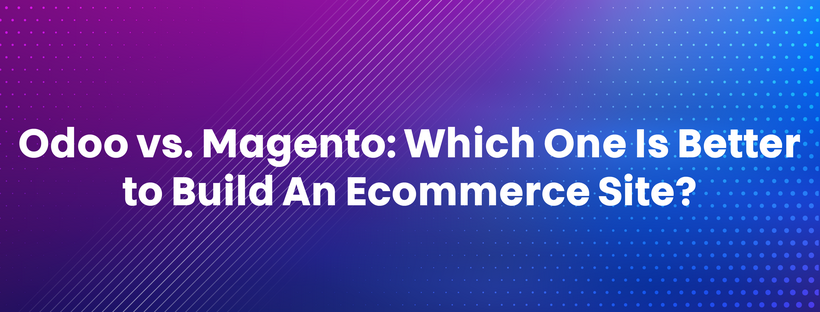Odoo vs Magento: Which one is better? This is a hard question for those who are finding the right platform to build an eCommerce website.
As the eCommerce industry is so developing that so many platforms are available in the market, it is difficult for newcomers to choose their “Mr.Right”. But don’t worry!
From now on, we want to develop blog series comparing platforms with each other. We have talked much about Magento. But is it really useful in comparison with others? Let’s find out in this series, starting with a comparison between Odoo vs Magento.
Let’s begin!
About Magento & Odoo

Magento eCommerce platform might be familiar among online businesses. It is an open-source platform written in PHP. Published in 2008, for over a decade of development, Magento has offered a modern and effective method for businesses to adapt to the industry’s continuous changes and generate more revenue.
At present, with over 250,000 users worldwide, Magento has earned its place in the sun and is considered one of the leading platforms.

As eCommerce is developing rapidly, many other platforms have entered the fierce competition face with Magento. Released in 2005, Odoo is formerly known as an OpenERP with a focus on ERP solutions. However, to expand the business, in 2014, the company changed its name to Odoo as a business application suite.
And currently, along with other platforms, especially Magento, Odoo is a powerful rival. It has gained an army of supporters with its integrated business management software, including so many tools such as CRM, eCommerce, billing, accounting, inventory management, to name but a few. Now, there are more than 7.300 Odoo apps available.
Both Magento and Odoo have their strengths and weaknesses. Let’s clarify those in different categories to make a decision.
Comparison Between Odoo vs Magento
Features (Usability)
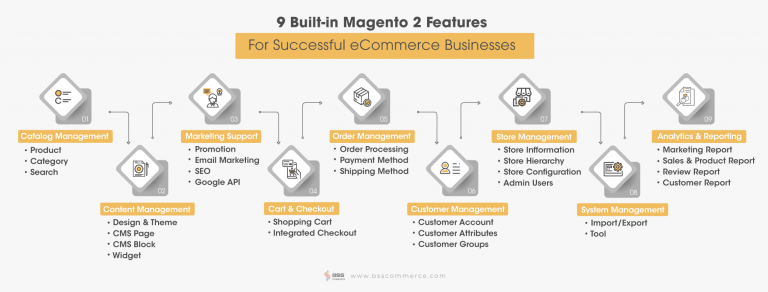
In terms of features and functionalities, both are powerful to help create an eCommerce store.
Magento is well known for its wide range of top-notch features. Each feature serves the specific demands of the eCommerce industry in all aspects:
- Customer segmentation
- Persistent shopping
- Private sales
- Dynamic rule-based product relations
- Automatic email reminder
But features available in Magento default are not enough to optimize the website. That’s why, along with setting up the platform, businesses also buy and download extensions to obtain additional functionalities, especially for the backend. But there’s no need to worry as Magento has thousands of premade solutions with various features in the market.
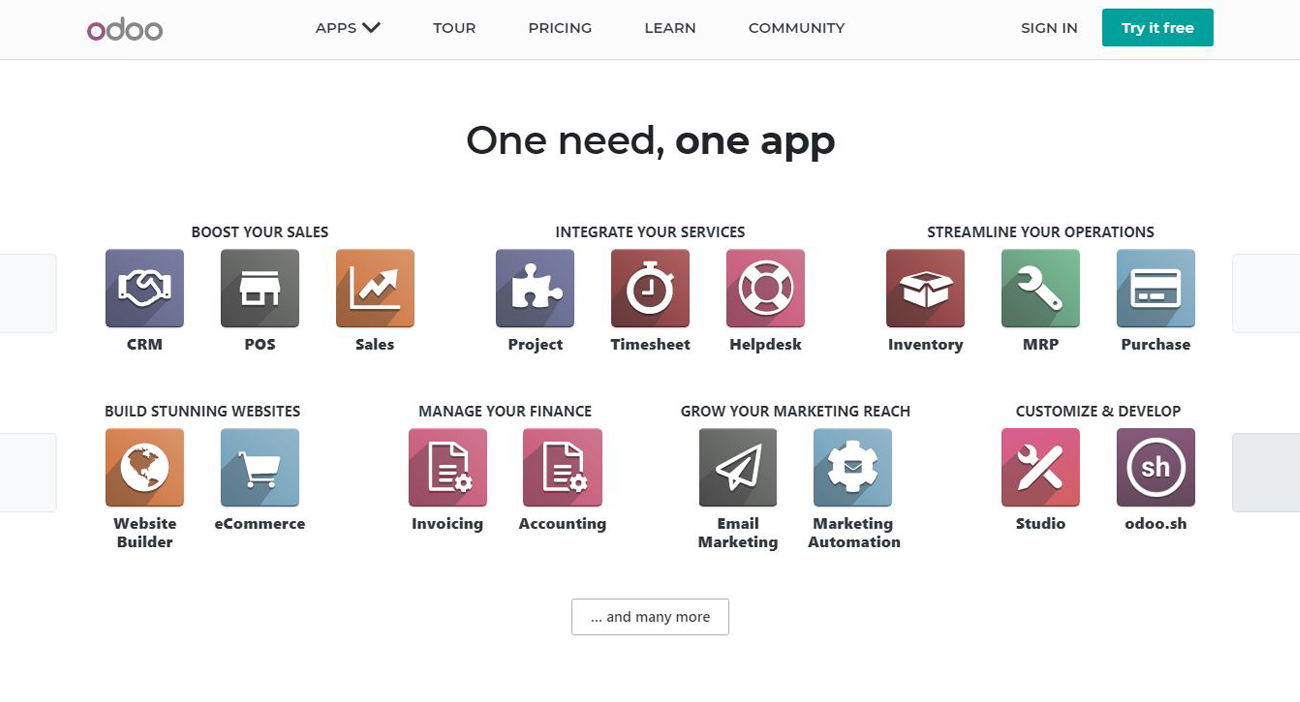
At first, Odoo introduced itself as an all-in-one solution. The software is fully integrated to solve problems related to CRM, accounting, analytics, inventory, and many more, and users don’t have to download any additional module. Hence, it might overcome Magento’s limitations.
However, Magento can still be the winner in terms of features as it is entirely designed for eCommerce purposes. Online retailers should consider Magento as the top priority.
Ease of Use

Ease of use is what we want to mention first. An easy-to-use platform is a top of mind of many businesses that are seeking an optimal platform.
In this perspective, Odoo is more advantageous than Magento. Beginners usually struggle when using Magento. Magento requires developers to look up related documents and deeply understand how it works. Not only that, developers should have experience and technical skills to deal with this platform.
Unlike Magento, Odoo apps are relatively easy to set up. Businesses can effortlessly create an eCommerce website by taking advantage of Odoo apps. Also, Odoo has designed simple drag and drop building blocks that enable businesses to build up their own eCommerce website even with no experts.
SEO

Magento is famous as an SEO-friendly platform. According to research from the Ecommerce Platform, Magento has received a relatively high SEO score, 95/100. This means that Magento’s SEO capabilities are highly appreciated.
Using Magento, users are provided with various tools to drive more traffic to their sites, making their websites rank higher on the search engines. Besides, the platform has a wide range of SEO settings like image optimization, meta tags for products, analytics to keep track of visitors, etc.
Odoo is also an excellent platform when it comes to SEO. It’s even better than the default Magento by supporting inline SEO suggestions and including an in-built link tracker feature.
Pricing
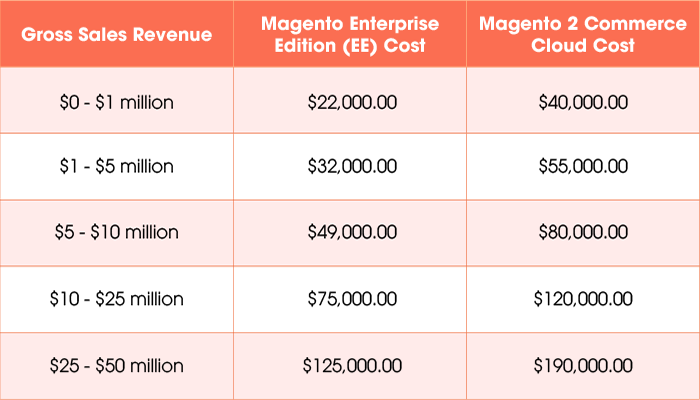
Magento Community Edition (CE) is FREE of charge. This version is fairly suitable for small to medium-sized enterprises (SMEs) with free program codes. In addition, Magento offers 2 charged versions: Magento Enterprise Edition (EE) and Magento Commerce Cloud (CC), with more premium features.
We suggest medium to large enterprises use one of the 2 charged versions. Despite the high pricing, businesses are provided with more advanced functionalities, added customization options, and support to a broader extent. But of course, it costs more if businesses buy additional extensions for their websites.
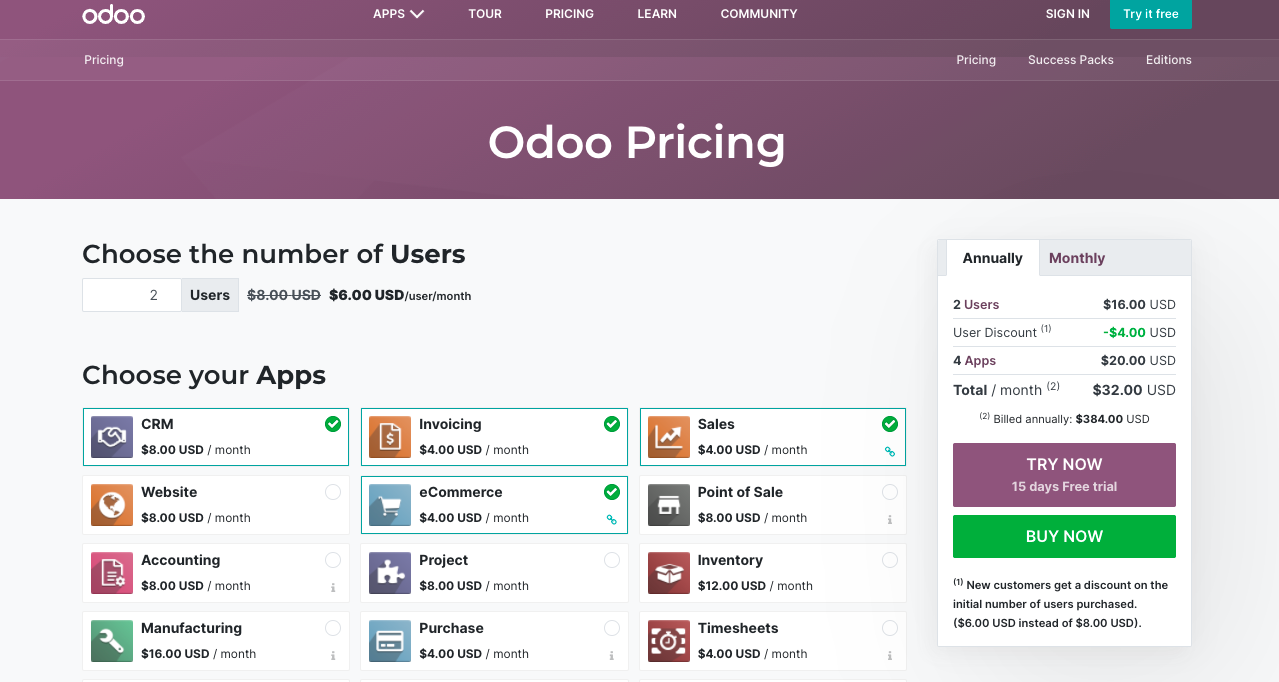
Odoo also offers 2 versions: open-source and paid version. The Paid version’s price varies as it is based on the number of users and which features they use. Each feature starts from $4/user/month. But before that, you will have a free trial in 15 days.
Community Support

Despite the difficulties, Magento has an extensive global network with a vast community of support. There are around 300.000 Magento developers and 258 partners worldwide available to help develop the platform and timely resolve issues.
The community support of Odoo is a little narrower. With just approximately 20.000 developers and still counting, it’s relatively challenging for Odoo compared with Magento. Nevertheless, Odoo is developing day by day. With around 5 million users globally, we have the basis to believe that Odoo will be more accessible in the near future.
Integrations & Extensions
As we have mentioned, Magento has a wide range of extensions (around 3.700 modules) developed by various technology partners worldwide. If you search Magento extension for a specific feature on Google, countless results will appear with both free and paid options.
Different from Magento, Odoo offers all available features for users to choose from freely. But it is also possible for store owners to use additional systems from other providers. But due to the complication, they might need professionals when integrating third-party solutions into the store.
Odoo vs Magento – Which One is Better?
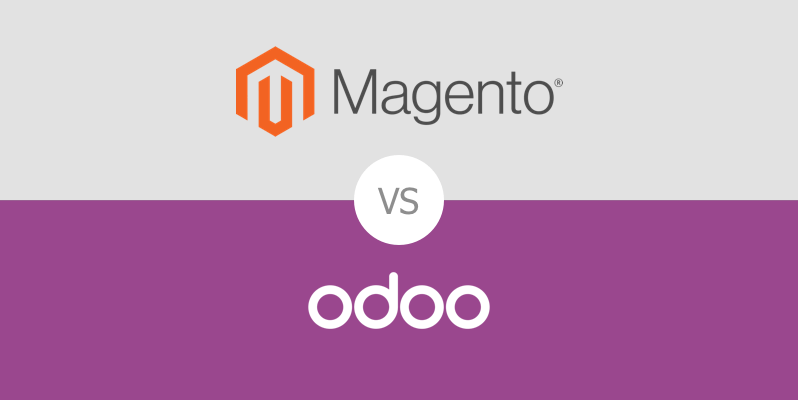
There is no fixed answer. The answer to such a question depends on your demands and expectations. Both platforms are undeniably robust and effective to build an eCommerce website.
Odoo’s powerful functionalities might be more suitable for SMEs rather than large enterprises. However, it supports businesses in different business fields, including eCommerce. But please remember that Odoo is strong at ERP, so you can consider utilizing its strength as much as possible in your business.
On the other hand, Magento is an eCommerce-focused platform. Therefore, Magento will enable eCommerce businesses to grow and expand thanks to its flexibility, scalability, various customization options, and a massive plugins marketplace. Overall, Magento is best suitable for medium to large-scale businesses with a huge inventory, large categories, high traffic, etc.
Undoubtedly, if you want to expand your online businesses, no matter which size it is, Magento should be at the top of your list.
Final Thoughts

All in all, above is our detailed comparison between Odoo vs Magento platform. We hope that this blog post is helpful enough for you to easily choose the right one for your business.
If you need further information about these 2 platforms, or other platforms as well, please don’t hesitate to contact us. We’re glad to answer at any time.
Thanks a lot for reading!

